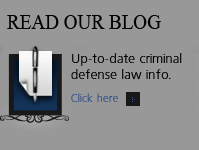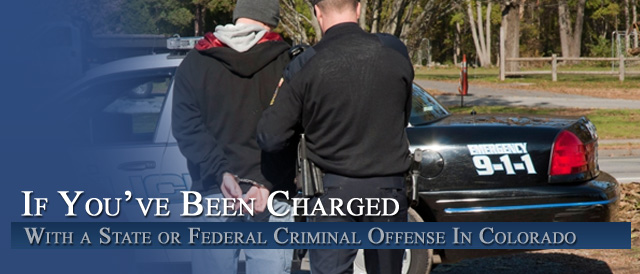

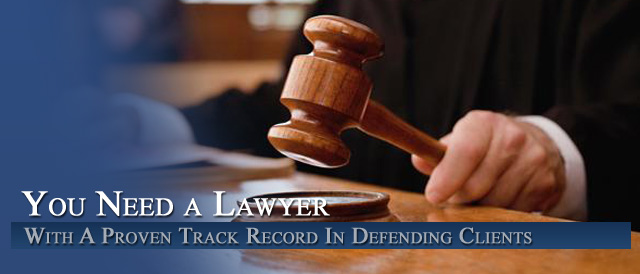
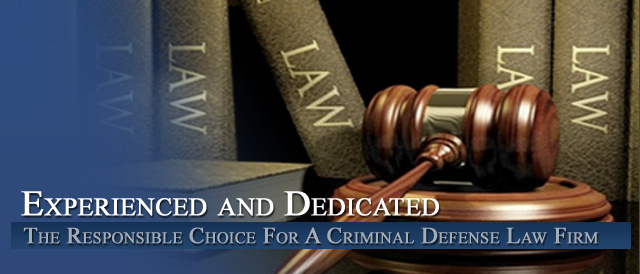
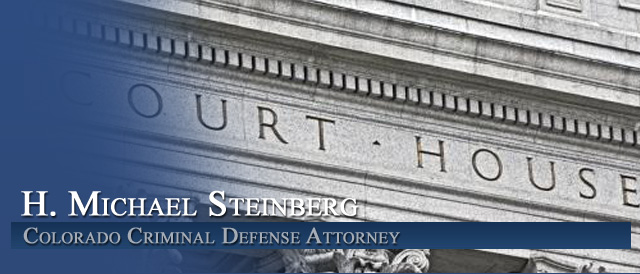
Colorado College Student Defense Lawyer
University Hearings After Drug Charges or DUI
Criminal charges against college students must be handled with careful attention to both the criminal proceedings and any disciplinary proceedings at the university. It takes special care to protect the student’s constitutional rights in the criminal court, while making a satisfactory response to the college’s disciplinary board.
Denver, Colorado defense attorney H. Michael Steinberg devotes 100 percent of his practice to criminal defense. Several times each year, he provides top-notch representation in criminal proceedings for college students, while also representing them before their college disciplinary boards.
College Student Criminal Defense: Preventing Criminal Convictions
A criminal conviction has a negative impact on anyone’s life. For college students, however, the consequences can be especially severe. A criminal record puts a college student at a disadvantage compared to his or her peers when, for example, seeking employment during and after college.
When working in college student criminal defense, attorney H. Michael Steinberg focuses his defense on the goal of keeping his clients’ criminal records clean. In all cases, he works with skill and dedication to minimize the negative consequences. He is qualified to handle college student criminal defense in all manner of felony and misdemeanor proceedings, including:
- Drug possession or drug distribution
- Drunk driving
- Motor vehicle crimes
- Sex offenses/so-called date rape
- Violent crimes like assault
- Credit card fraud and other financial crimes
Attorney H. Michael Steinberg works with students from all Colorado colleges and universities, including the University of Colorado, University of Denver, Colorado College, University of Northern Colorado, Colorado State University and the Colorado School of Mines.
College Student Criminal Defense: University Disciplinary Proceedings
College student criminal defense is complicated by the relationship between the criminal proceedings and the college disciplinary hearing. Often, the student must respond to school disciplinary proceedings while the criminal case is still proceeding. Criminal defendants have the constitutional right to remain silent and not incriminate themselves. However, college students sometimes find themselves in the awkward position of having to explain themselves to university disciplinary committees before their criminal cases are resolved. Attorney H. Michael Steinberg is sensitive to the special needs of college students charged with criminal offenses, and has counseled and appeared as a student advocate at student disciplinary hearings throughout Colorado.
An arrest on campus not only exposes you to the risk of incarceration, fines, and the consequences of a criminal record, it can also jeopardize your access to such essential aspects of the academic experience as on-campus housing, financial aid, federally subsidized student loans, or eligibility for honors programs. The advice of an experienced criminal defense attorney can help you resolve the immediate criminal charges with an eye on the academic trouble the student might also be facing.
Criminal charges can result in sanctions imposed at a university judicial affairs meeting. Hearing officers are under a certain amount of institutional pressure to maintain consistency between one student’s outcome and another’s under similar facts, so your lawyer needs both familiarity with the standard range of sanctions and the ability to distinguish one case from another to justify a lighter punishment.
Example of a University’s Judicial Affairs Procedure
(This is similar to most colleges and universities)
What to Expect from the Conduct Process, a Step-by-Step Guide
1.The Office of Student Conduct (OSC) Receives report and assigns a conduct officer to the case
The Reports come from a number of different sources, including the Boulder Police Department, the University of Colorado Police Department and Housing and Residence Life.
2.The Conduct Officer reviews report, generates and e-mails conference notice to student. All conference notices are sent to the student’s official University of Colorado e-mail account.
The conference notice outlines what provision of the Student Conduct Code the student allegedly violated, instructions on scheduling a conference, information on how to obtain a report if it came from an outside agency, and their rights and responsibilities in the conference.
3.Student schedules conference
4.The Conference
The conference is a time for the student to respond to the alleged violations of the Student Conduct Code. The student will sign the case resolution preference form, which outlines the student’s rights and responsibilities and gives the student a chance to either accept or deny the alleged violations of the student conduct code. The student has the right to have an advisor present at the conference. In most cases, no matter if the student accepts or denies responsibility for violating the aforementioned code, the conduct officer will continue with the conference gathering the student’s recollection of the events from incident, witness statements, and any other relevant evidentiary information.
5. Investigation/follow-up (if necessary)
This may include contacting witnesses, police officers, business owners, and others who may have information on the incident.
6.Student found responsible or not responsible
The decision letter is mailed to the student.
7.Sanctions assigned if student is found responsible
Sanctions may include both active and inactive sanctions. Active sanctions include, but are not limited to alcohol and/or drug education classes, CU Restorative Justice, community service, and research/reflection papers. Inactive sanctions include, but are not limited to probation, suspension, and in extreme cases, expulsion.
8.Student completes sanctions
It is the student’s responsibility to complete and provide proof of completion to our office by the due date prescribed in the decision letter.
Records retained for a minimum of 7 years after the student graduates or permanently withdraws from the University.
Links to the University of Colorado Judicial Affairs Office
Examples of the University’s Idea of Prohibited Student Conduct
Prohibited Student Conduct
1. Assaulting or physically abusing another person or being involved in brawling.
2. Intimate partner violence.
3. Threatening or endangering the health or safety of a person (one’s self or others).
4. Sexual Misconduct. Sexual Misconduct includes Non-consensual sexual intercourse, Non-consensual sexual contact and Sexual exploitation or exposure.
a. Non-consensual sexual intercourse: Non-consensual sexual intercourse is any sexual intercourse (anal, oral or vaginal), including sexual intercourse with an object, however slight, by one person upon another without consent.
b. Non-consensual sexual contact: Non-consensual sexual contact is any sexual touching (including touching with an object) however slight, by one person on another without consent.
c. Sexual exploitation and/or exposure: Sexual Exploitation is when a student takes non consensual, unjust or abusive sexual advantage of another for his/her own pleasure, advantage or benefit, or to pleasure, benefit or advantage anyone other than the one being exploited.
Sexual Exposure occurs when a student engages in lewd exposure of the body done with the intent to arouse or satisfy the sexual desire of any person.
5. Indecently exposing one’s body.
6. Stalking. Repeated conduct which reasonably and subjectively causes another person to fear for his/her safety or repeated conduct which causes a person to alter his/her activities in response to the repeated conduct. Such repeated conduct may include but is not limited to any of the following: following or approaching a person or a member of that person’s family or household; contacting a person or a member of that person’s family or household whether or not conversation ensues; and placing a person or a member of that person’s family or household under surveillance.
7. Hazing. Any action or situation that recklessly or intentionally endangers the health, safety, or welfare of an individual for the purpose of initiation, participation, admission into or affiliation with any organization at the university. Hazing includes, but is not limited to, any abuse of a mental or physical nature, forced consumption of any food, liquor, drugs, or substances, or any forced physical activity that could adversely affect the health or safety of an individual. Hazing also includes any activity that would subject the individual to embarrassment or humiliation, the willingness of the participant in such activity notwithstanding
8. Abusive Conduct. Unwelcome conduct by an individual(s) that is sufficiently severe or pervasive that it alters the conditions of education or employment and creates an environment that a reasonable person would find intimidating, hostile or offensive. The determination of whether an environment is hostile must be based on all of the circumstances. These circumstances could include the frequency of the conduct, its severity, and whether it is threatening or humiliating. Simple teasing, offhand comments and isolated incidents (unless extremely serious) will not amount to abusive conduct
9. Violating any federal, state or local law, university regulation or policy.
10. Interfering with, obstructing or disrupting a university activity.
11. Interfering with, obstructing or disrupting police or fire responses.
12. Failing to comply with the direction of university officials who are performing their
duties.
13. Failing to abide by or complete a university sanction in a satisfactory manner, including violating the Student Conduct Code while on university probation or suspension in abeyance.
14. Providing false information to university officials, conduct officers, boards, or peace officers in the performance of their duties.
15. Retaliating against or discouraging an individual from participating in a university process, acting to improperly influence a university conduct body, or unauthorized release of confidential student or university information records.
16. Violating any Housing and Dining Services policy.
17. Unauthorized entry into or exit from university property or property belonging to another.
18. Damaging university property or property belonging to another.
19. Engaging in, inciting or arming someone for a riot or public disturbance.
20. Use of electronic or other devices to make an unauthorized audio or video record.
21. Possessing firearms, explosives, fireworks, incendiary devices, ammunition or other weapons on campus.
22. Theft or possessing property known to be stolen, or taking property of another without consent, even with an intent to return the property.
23. Possessing, using, providing, manufacturing, distributing or selling drugs or drug paraphernalia in violation of law or university policies.
24. Possessing, using, providing, manufacturing, distributing or selling alcoholic beverages in violation of law or university policies.
Sanctions
1. Overview.
a. After hearing the case, the conduct officer/conduct board (in an administrative conference, in an administrative disposition, or within Housing and Dining Services), may find by a preponderance of the information that the charged student is not responsible, or may find the student responsible and issue a sanction based on that finding. The charged student and an alleged victim may provide an impact statement or character references for consideration during the sanction process, if the student is found responsible.
b. Sanctions imposed for misconduct will be based upon a consideration of all of the circumstances in a particular case. Mitigating and aggravating circumstances may be considered. Repeated violations are likely to result in progressively severe sanctions. One or more of the sanctions below may be imposed. In all cases, the conduct officer and conduct body reserve the right to use their discretion in determining the appropriate sanction for a case, which could include lower or higher sanctions than the prescribed guidelines. All decisions regarding responsibility and appropriate sanctions will be given to a student in writing.
2. Educational Sanctions. The student may be required to perform a specific number of hours of community service, complete a reflection or research paper, attend a class, program or lecture, or be involved with the community in a way that brings about a new understanding of the community and how his/her behavior may have impacted others. This is not an exhaustive list but should serve as a reference for the types of educational sanctions that may be imposed.
3. Warning/Written Reprimand. A warning/written reprimand is a written statement from the conduct body that the behavior was inappropriate and that more serious conduct action will be taken should subsequent infractions occur.
4. Residence Hall Reassignment. A student who resides in a residence hall is assigned to a different residence hall on campus.
5. Residence Hall Termination. A student’s residence hall agreement is terminated through the conduct process and the student is prohibited from residing in any university residence hall on either a permanent or temporary basis. Specific exclusion from the residence halls may also be imposed. Termination may occur in cases where a student appears to be involved in violations of the Student Conduct Code and the behavior or pattern of behavior has a significant negative impact on his/her living community.
Residence Hall Termination in Abeyance. The student’s residence hall agreement is terminated, but due to mitigating circumstances the termination is deferred, allowing the student to continue living in the residence hall and providing a student with a final opportunity to prove they can operate responsibly within the living community. If the student, through the conduct process, is found to have violated the Student Conduct Code or any Residence Hall Living Policy during the period of termination in abeyance, the student will be immediately terminated from the residence hall for the duration of the abeyance, and may be given additional sanctions, including an extension of the termination and suspension.
6. Probation. A student is placed on probation. Probation lasts for a specific period of time, and is implemented by semesters. Any violation of the Student Conduct Code or the conditions of probation committed during the probationary period will result in further disciplinary action.
7. Suspension. The student is required to leave the university for a specific period of time. A suspension notation appears on the student’s transcript. After the period of suspension has expired, the transcript notation will be removed. The student is required to apply for readmission to the university after his/her suspension period. Suspension from the university includes an exclusion from campus property during the period of suspension. A suspension decision results in the student being suspended from all campuses of the University of Colorado system.
Suspension in Abeyance. The student is suspended from the university, but due to mitigating circumstances the suspension is deferred, allowing the student to continue with daily university activities and providing a student with a final opportunity to prove they can operate responsibly within the community. If the student, through the conduct process, is found to have violated the Student Conduct Code during the period of the suspension in abeyance, the student will be immediately suspended from the university for the duration of the abeyance, as well as given additional sanctions, including an extension of the suspension, or expulsion. A suspension notation does not appear on the student’s transcript during the period of suspension in abeyance.
______________________________________
A student facing a disciplinary proceeding may have already been criminally charged, and therefore may have already retained a criminal defense attorney. If so, representation in a college disciplinary proceeding may occur as a matter of course.
A student without a criminal defense attorney who faces disciplinary proceedings should strongly consider contacting one to assess the utility of such representation. In many instances, the involvement of the right criminal defense attorney can make a significant difference in the outcome of not just the criminal case, but also the student’s academic future. In choosing the appropriate attorney, an important consideration should be whether he or she is also experienced in handling college student disciplinary proceedings.
Other Articles of Interest:
- Understanding The Impact Of Colorado University – College Student Discipline Cases On Your Future
- Our Qualifications
- FAQ: Colorado Criminal Juvenile Law – What Kind of Information is Given to the Schools When My Child is Charged With a Colorado Juvenile Crime
- 030. COLORADO CRIMINAL CODE – CRIMES INVOLVING FIREARMS AND WEAPONS
- Law Links on the Web

